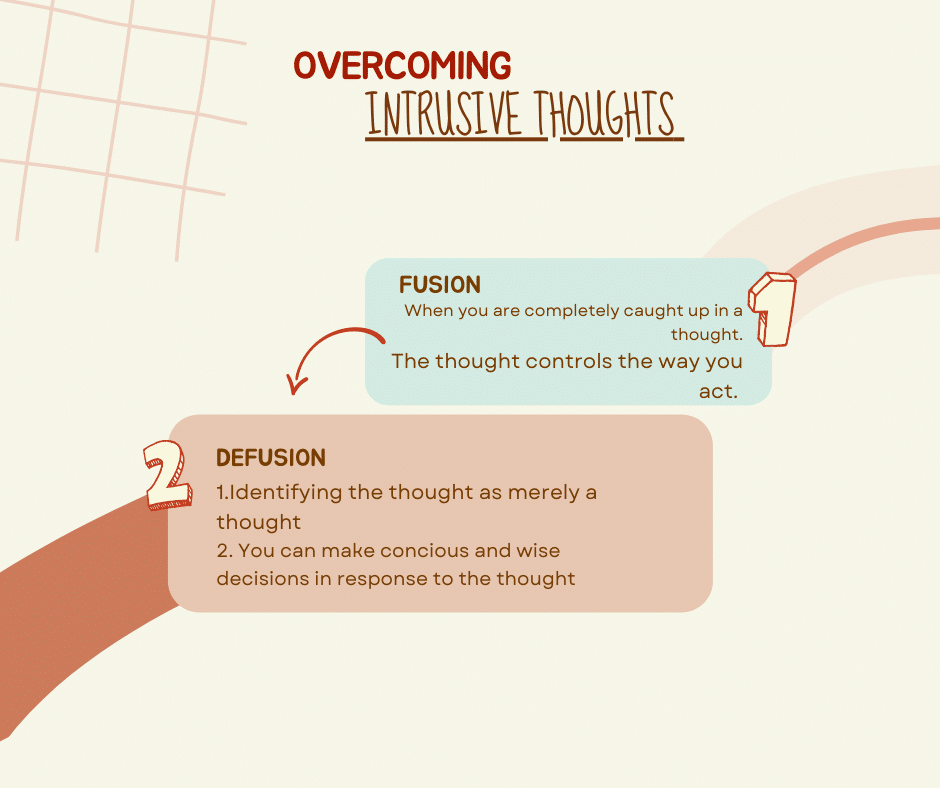
Overcoming intrusive thoughts can be very difficult. In fact, research illustrates a ‘boomerang effect’ in which the more we try to not think about a thought, the louder it tends to become. A great example to explain this is like when you have a song stuck in your head and the more you keep trying to get it out of your head, the louder it seems to become. This creates an almost ‘tug-of-war’ situation within ourselves.
Additionally, when we are told to NOT think about a specific thing, our minds usually automatically start thinking about that specific thing. For example, if somebody told you NOT to think about what you had for dinner last night, your mind would probably go and think about exactly that. Typically, no matter how much money you’re offered or how much you’re threatened not to, it is very challenging to not have at least a fleeting thought about what you were asked not to think about. This is because you wouldn’t be able to control the thought from passing through your mind!
We are not in control of our thoughts, at least not to the extent we would like to think we are. Thoughts are more like events that are passing through our awareness. Thoughts become intrusive when you grab them, hold on to them, fight with them and take them on as reality. However, we’re not going to overcome intrusive thoughts by trying to suppress them.
How To Overcome Intrusive Thoughts
Let yourself experience thoughts as they really are, which are words and pictures passing through your mind. Try and see if you can watch ‘thinking’ happen as an event like if you were sitting in a food court watching people walk by you in the mall. Try to get the same kind of perspective and distance when you’re watching your own thinking. Acceptance and Commitment Therapy is like the philosophy of psychology and this method is what call an ACT (Acceptance and Commitment Therapy) defusion.
Fusion is when we are totally caught up in a thought and it seems like reality and from this place of fusion, it tends to control the way we act. Our behaviors can tend to change in response to this thought we’re having.
Defusion is when we step back and see the difference between ourselves and this thought and identifying the thought as only a thought. From a place of defusion, in which there is space between ourselves and this thought, we can ask ourselves that if we buy this thought, which direction do we go? Does this move me toward the person I want to be, the life I want to live or away from that?
Thus, from this place of defusion, we can make more conscious and wise decisions in terms of how we’re going to respond to the thought. Nevertheless, at this point, your mind could be trying to convince you that the thought is true or that you can never do the defusion thing which inevitably brings up more thoughts, as this is what minds do. Again, it is important to notice these thoughts too and asking yourself which direction do you go, if you buy the thought.

Defusion Techniques
- Label the thought as a thought
- When a thought pops into your mind that you don’t want to buy into, just say ‘thank you mind’ and let it go by
- Turn the thought into a song or jingle
- Label the thought as a story
These techniques are not meant to ridicule our thoughts or beat ourselves up for them, but just to help our thoughts feel lighter and not take them so seriously.
Cautions when it comes to overcoming intrusive thoughts
- Understanding that we’re not trying to get rid of intrusive thoughts as that’s almost impossible, but are using defusion techniques as a way to hold these thoughts a little bit lighter so that they can pass through our awareness without us getting overly involved.
- Understanding that defusion techniques will not always make you feel better, and it is not a technique to control your emotions.
- Drop the idea of perfectionism. You are not always going to be able to defuse from every thought or even remember to do it. We swim in our thoughts all day and defusion is like coming up for air. We only really need to use defusion when the intrusive thought is really starting to influence our lives in a way we don’t like.
- Sometimes you won’t be able to defuse as the thought is just too intrusive and too much. In those moments, it is okay to just recognize that you are fused. You can remind yourself that this is just temporary and this too shall pass.
- Learning to defuse unhelpful thinking is a powerful skill that can help people overcome all kinds of mental health conditions, including anxiety and depression.
Leave a Reply